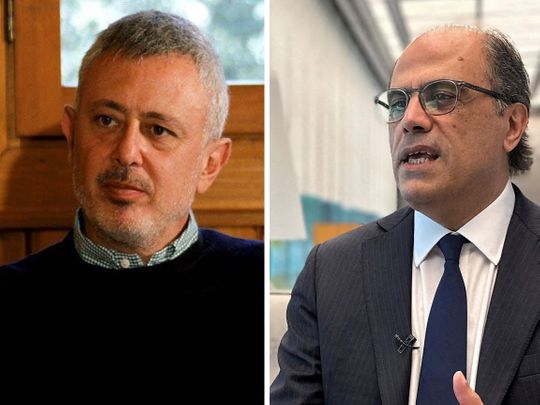Lebanon’s next presidential voting session will be held on June 14, Parliament Speaker Nabih Berri has said.
It will be the twelfth in a series of attempts by Lebanese lawmakers to elect a new president since the end of Michel Aoun’s tenure last October.
Many hope that it also be the last of the 12 sessions, now that two strong candidates have emerged for the country’s top job: Jihad Azour and Sulaiman Frangieh.

The first is backed by the two Christian parties — the Lebanese Forces (LF) and the Free Patriotic Movement (FPM) — while Frangieh is supported by the twin Shiite parties, Hezbollah and Amal.
According to an 80-year-old agreement known as the National Pact, the Lebanese presidency since 1943 has been reserved exclusively for a Maronite Christian. Both candidates hail from family’s with presidential ambitions. Azour’s uncle Jean Obeid was presidential candidate in 2008 while Frangieh’s great-uncle Hamid had been presidential candidate in 1952.
Families with an ambition
And in 1970-1970, his grandfather and namesake had served as president of Lebanon at the outbreak of the country’s civil war.
Same age, different careers
The two present candidates are of the same age; Frangieh born in 1965, Azour 1966. But that aside, they have little in common.
After a postdoctoral fellowship at Harvard University, the Paris-trained economist Azour served as finance minister during the years 2005-2008 and is now director of the Middle East and Central Asia Department at the International Monetary Fund (IMF).
Frangieh entered politics with a blood feud at the tender age of 17, after his father had been assassinated during the early stages of the civil war in 1978. He eventually took over the Zghorta-based family militia Marada, turning it into a political party after the civil war ended. A seven-time cabinet minister, he first entered government at the young age of twenty-five back in 1990, and his last tenure was as minister of interior in 2005. Throughout his career, he has been close to Syria and Hezbollah.
Power politics 2023
The twin Shiite parties have been lobbying for Frangieh for years, and had originally wanted him president back in 2016, but delayed it for the sake of their other Christian ally Michel Aoun. When Aoun’s term expired last Autumn, they made it clear that they would accept no other name for president, infuriating Aoun’s son-in-law Gibran Bassil, who had his eyes set on the presidency.
After trying to convince Hezbollah to support him – with no luck – Bassil teamed up with his arch rival Samir Geagea, temporarily setting aside their lifelong differences to abort Frangieh’s presidential bid.
Geagea’s original candidate for president was army commander, Joseph Aoun, while after losing hope in his own nomination suggested for ex-interior minister Ziad Baroud. Azour’s name was actually first put forth by veteran Druze leader Walid Jumblatt.
Both Geagea and Bassil finally agreed to jointly support Azour, hoping that at a bare minimum Frangieh won’t enter Baabda Palace uncontested.
Election Day
Azour himself is not based in Lebanon and it is unclear whether he plans to be in Beirut on Election Day. He last visited on May 25, 2023, making sure to come across as a compromise candidate who doesn’t provoke any of the main players, paying a courtesy visit to leaders from both ends of the political spectrum, from Samir Gagegea to Nabih Berri.
A majority in the Chamber of Deputies
Electing a president requires 65-votes in the Chamber of Deputies. As of today, neither candidate can claim a majority, trigging intense lobbying between now and 14 June.
The twin Shiite parties combined will be voting for Frangieh – with a total of 27 votes – and so Frangieh’s own 4-man bloc, and 8 Muslim MPs from the Hezbollah-led 8 March Coalition, and 11 from a coalition of independents and parliamentarians affiliated with incumbent prime minister, Najib Mikati. It is rumoured in Beirut that in exchange for his votes, Mikati will get to stay as premier under a Frangieh presidency. And finally, five MPs from Bassil’s bloc are expected to defy him and vote for Frangieh as well. In total, that’s roughly 55 votes, 10 votes short of a majority.
Meanwhile, the Lebanese Forces and Free Patriotic Movement combined can secure 36 direct votes for Jihad Azour, backed by 4 from the Lebanese Phalange, 3 from the Armenian Tashnag Party, 2 from the Independence Movement, and at least 6 out of 13 newcomers to the Lebanese Parliament, dubbed the “Change Bloc.”
That’s a total of 51 votes, still not enough to make Azour president.
And this is where lobbying will go into effect, targeting independents mostly, and the eight-man bloc of Walid Junlatt. He is the man to have first nominated Jihad Azour for president and a lifelong friend of the Frangieh family. In fact, it was his father’s last-minute vote in favor of Frangieh’s grandfather, back in 1970, that made him president. But he now says that he won’t be voting for Frangieh, without necessarily committing to Azour.
Source: Gulf News


